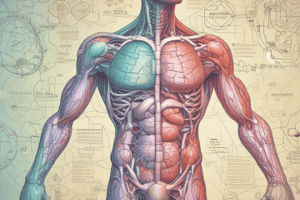Podcast
Questions and Answers
What percentage of daily calorie needs are typically met by sugars?
What percentage of daily calorie needs are typically met by sugars?
What happens to excess carbohydrates and fats that are not immediately used for energy?
What happens to excess carbohydrates and fats that are not immediately used for energy?
What is the primary consequence of persistent overconsumption of fuels?
What is the primary consequence of persistent overconsumption of fuels?
When does the body start breaking down amino acids for energy?
When does the body start breaking down amino acids for energy?
Signup and view all the answers
What is the potential consequence of using amino acids as an energy source?
What is the potential consequence of using amino acids as an energy source?
Signup and view all the answers
Which of the following is NOT a factor that can influence the ratio of fats, sugars, and proteins required for optimal energy intake?
Which of the following is NOT a factor that can influence the ratio of fats, sugars, and proteins required for optimal energy intake?
Signup and view all the answers
What is the approximate daily calorie requirement for a typical adult?
What is the approximate daily calorie requirement for a typical adult?
Signup and view all the answers
Flashcards
Metabolic Adaptation
Metabolic Adaptation
The body's adjustment to energy needs during fasting, feasting, and metabolic disorders.
Daily Caloric Requirement
Daily Caloric Requirement
70 kg adults need 2400-2000 kcal daily to maintain energy balance.
Macronutrient Ratios
Macronutrient Ratios
Distribution of daily calories: Fats (30-40%), Sugars (40-60%), Proteins (10-15%).
Energy Storage Forms
Energy Storage Forms
Signup and view all the flashcards
Consequences of Overconsumption
Consequences of Overconsumption
Signup and view all the flashcards
Consequences of Insufficient Intake
Consequences of Insufficient Intake
Signup and view all the flashcards
Amino Acids for Energy
Amino Acids for Energy
Signup and view all the flashcards
Study Notes
Human Metabolic Needs
- An adult (70 kg) needs 2400-2000 calories daily
- This requirement comes from:
- Fats (30-40%)
- Carbohydrates (40-60%)
- Proteins (10-15%)
- Alcohol, if consumed, also contributes to energy intake.
- The proportions vary depending on the individual's intake (i.e., fasting, eating, physical activity).
Energy Storage
- The body stores excess carbohydrates (glycogen in the liver and muscles) and fats (in adipose tissue) for use between meals.
- Excessive intake above expenditure leads to obesity and health risks.
Insufficient Energy Intake
- If intake is less than expenditure, the body's carbohydrate and fat stores are depleted.
- Amino acids from protein breakdown can be used for energy, instead of protein synthesis.
- This can result in weakness, wasting, and even death.
Studying That Suits You
Use AI to generate personalized quizzes and flashcards to suit your learning preferences.
Description
Test your knowledge on human metabolic needs, energy storage, and the effects of caloric intake on health. This quiz covers essential topics such as daily caloric requirements, the role of macronutrients, and consequences of insufficient energy intake. Understand how the body manages energy and its implications for health.





